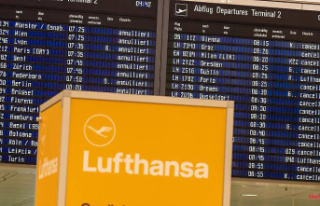So far, international cooperation in space has survived all political crises. But now Russia is announcing its departure from the ISS. It is unclear how work in the cosmos will continue without the space nation. NASA is surprised.
Russia wants to get out of the International Space Station ISS after 2024, but according to NASA it has not yet informed it. "NASA has not been made aware of decisions by any of the partners," said NASA chief Bill Nelson. NASA is still committed to operating the ISS until 2030 and is therefore coordinating its work with its partners.
The Russian space agency Roskosmos had previously announced that it would phase out operations on the ISS after 2024. "Of course we will fulfill all our obligations to our partners, but the decision to exit this station after 2024 has been made," said new Roscosmos boss Yuri Borissov at a meeting with Russian President Vladimir Putin. US National Security Council Communications Director John Kirby said the Russian government has not officially notified the US of any such intention. Options are being explored to mitigate potential impacts on the ISS after 2024, Kirby said.
The USA, Russia, Canada, Japan and member states of the European space agency Esa are involved in the ISS. Without the cooperation of Russia, however, the station cannot continue to operate in this way. It is unclear what will happen to mankind's more than 20-year-old and now breakdown-prone outpost after 2024. Most recently, Russia sunk its Mir space station in the Pacific in 2001 after 15 years of operation. The message from Moscow did not come as a surprise. The ISS, hovering 400 kilometers above the earth, was getting on in years and repeatedly caused a stir due to breakdowns.
After the invasion of Ukraine ordered by Putin, Western countries also imposed sanctions on the Russian space industry, which is why Roskosmos is complaining about massive technical problems. The recently replaced head of Roskosmos, Dmitry Rogozin, had recently repeatedly questioned cooperation with the USA, also in view of the serious political tensions between Moscow and Washington in the course of the war. Rogozin had not ruled out decoupling the Russian module from the ISS and continuing to operate it independently. He also indicated a possible use of the station for military earth observation.
His successor Borisov has now announced that the construction of a Russian space station should begin before the exit. Russian rocket maker Energiya chief designer Vladimir Solovyov said the first module for Russia's new space station could be launched in 2028. The decision to build must be made by the end of this year. The module could be taken into space with an "Angara-A5M" rocket from the Vostochny cosmodrome, he said.
The ISS has so far been seen as a sign of hope for international understanding: "The lasting legacy of the ISS will very likely be international cooperation and a place of peace," said US astronaut Thomas Marshburn in May when he was handed over command on board the ISS told his Russian colleague Oleg Artemyev. According to Moscow, the cooperation on the ISS should continue until the Russian exit.












